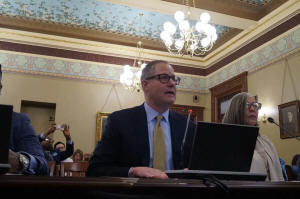State lawmakers brace for possible federal cuts to Medicaid
[March 06, 2025]
By Peter Hancock, Jade Aubrey
SPRINGFIELD – Health care advocates, hospital officials and people who
rely on Medicaid for their medical coverage warned state lawmakers
Wednesday of consequences that could result from proposed cuts in
federal Medicaid funding.
“This is it. This is absolutely it. This is the line,” said Carrie
Chapman, senior director of litigation and advocacy at Legal Council for
Health Justice, a Chicago-based advocacy group. “Medicaid stays or goes
as the program that we’ve know it right now.”
Chapman was among nearly a dozen people who spoke Wednesday to an
Illinois House budget committee that oversees spending for human
services, including Medicaid, the public health insurance program that
covers about 3.4 million lower-income people in Illinois.
Established in 1965 alongside Medicare, the federally funded health
insurance program for seniors, Medicaid has traditionally targeted
lower-income pregnant women, children, seniors, parents, and people with
disabilities. In Illinois, the federal government pays approximately 51%
of the cost of covering those individuals’ care.
However, with passage of the Affordable Care Act in 2010, Medicaid
eligibility was expanded to include working-age adults with incomes up
to 138% of the federal poverty level. Approximately 770,000 people in
that category are covered by Illinois Medicaid and the federal
government pays 90% of the cost for that expansion group.

Currently, according to the Illinois Department of Healthcare and Family
Services, Medicaid pays for about half of all child births in Illinois
and two-thirds of all nursing home days. Nearly 50% of Illinoisians
living with HIV are covered by Medicaid, as well as almost 80% of people
served by community mental health centers.
All told, according to the state comptroller’s office, Illinois spent
about $36.9 billion on Medicaid in the fiscal year that ended June 30.
Illinois Department of Healthcare and Family Services Director Lizzie
Whitehorn said about 62% of total state Medicaid spending comes from the
federal government.
At issue was a budget resolution that recently passed the
Republican-controlled U.S. House in Washington, which calls for deep
cuts in federal spending. Part of that resolution calls on the U.S.
House Committee on Energy and Commerce, which has jurisdiction over
Medicaid, to cut $880 billion from the federal budget deficit over the
next 10 years.
Because Medicaid makes up a large part of all the programs the Energy
and Commerce Committee oversees, many have assumed that cuts of that
size would have to include substantial cuts to Medicaid.
“There’s no way they can cut that much out of the federal budget without
touching Medicaid, because Medicaid is such a substantial portion of the
discretionary funds that they have access to,” Rep. Anna Moeller,
D-Elgin, who chairs the legislative appropriations committee, said after
the hearing.
Whitehorn noted that the expansion of Medicaid under the Affordable Care
Act resulted in cutting the state’s uninsured rate in half and reducing
the amount of uncompensated care delivered in Illinois by more than a
third.
“Federal cuts would mean we have to limit services or eligibility,” she
told the committee. “And we don’t have the money as a state to make up
the difference.”

[to top of second column]
|

A.J. Wilhelmi, president and CEO of the Illinois Health and Hospital
Association, testifies to a House budget committee about the impact
of proposed cuts in federal funding for Medicaid. (Capitol News
Illinois photo by Peter Hancock)

A.J. Wilhelmi, president and CEO of the Illinois Health and Hospital
Association, described the list of proposals being considered in
Washington as “both sweeping and shocking.” He said they include turning
federal Medicaid spending into a block grant to states, establishing per
capita caps on Medicaid benefits, and eliminating certain funding
mechanisms, known as provider taxes, that are used to draw down
additional federal matching funds to support the cost of operating
hospitals.
“And make no mistake, there would be no hospital Medicaid program
without hospital provider taxes,” he said.
Last month, Gov. JB Pritzker laid out a $55.2 billion budget proposal to
the Democratic-controlled General Assembly to fund state government
operations over the 2026 fiscal year, which begins July 1. In his budget
address, however, he noted the uncertainty of various streams of federal
funds that are used to help pay the cost of many state operations,
including Medicaid.
Rep. Bob Morgan, D-Deerfield, who serves on the committee, said
Wednesday that the decision about future federal Medicaid funding is in
the hands of the Republican-controlled Congress. He urged GOP members of
the General Assembly to use their influence to persuade the three
Illinois Republicans in the U.S. House to vote against cutting Medicaid
funding.
“So I’ll just close with my request to the minority spokesmen and the
minority members of this committee to come back in a week to share with
this entire committee those letters and those emails and those texts in
discussion with us about the things they have done to make sure that the
U.S. House of Representatives and the U.S. Senate and the president do
not make these horrible, horrible, damaging, life-impacting cuts to our
Medicaid system,” he said.
Republicans on the panel argued that the subject of federal budget
negotiations was beyond the scope of the state legislative committee’s
purview and suggested Wednesday’s hearing was more about partisan
politics than solving the state’s budget issues.

“And so this, I think, is performative,” said Rep. William Hauter,
R-Morton. “We don’t know what will happen. There’s a lot of things that
we have no control over, budget negotiations going on at the national
level.”
Moeller argued the hearing was more than a stage show, noting that
Congress faces a March 14 deadline to pass a bill to renew federal
spending authority or face a partial shutdown of the federal government.
“This hearing this morning is far more than performative,” she said. “We
are going to be heading into our budget cycle, our budget making
process, with huge uncertainty hanging over our heads. What happens on
March 15, in the next few weeks, in Washington, D.C., will have a direct
impact on the level of funding that we will have available for all of
these important programs.”
Capitol News Illinois is
a nonprofit, nonpartisan news service that distributes state government
coverage to hundreds of news outlets statewide. It is funded primarily
by the Illinois Press Foundation and the Robert R. McCormick Foundation. |